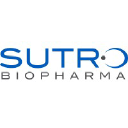Companies
Discover all trending biotech companies
Discover all trending biotech companies

Company Research Platform
Annual Revenue
$ 62,000,000
Global Employees
235
R&D Investment
51600000
This segment focuses on the research, development, and clinical evaluation of Antibody-Drug Conjugates (ADCs) for the treatment of various cancers. Sutro Biopharma utilizes its proprietary XpressCF+ platform to design and manufacture ADCs with site-specific conjugation, aiming for improved efficacy and reduced toxicity. The lead ADC candidates, STRO-001 (targeting CD74 in multiple myeloma and non-Hodgkin lymphoma) and STRO-002 (targeting folate receptor-alpha in ovarian and endometrial cancers), are currently in Phase 1 clinical trials. The company is actively involved in preclinical research to expand its ADC pipeline and explore novel targets. This segment's success hinges on clinical trial outcomes, regulatory approvals, and strategic partnerships to commercialize these innovative cancer therapies. The company's competitive advantage lies in its cell-free protein synthesis technology, which enables the creation of highly specific and effective ADCs. Future opportunities include expanding the ADC pipeline into additional cancer indications and developing next-generation ADCs with enhanced properties.
This segment involves the research and development of novel cytokine derivatives for cancer and autoimmune disorders. Sutro Biopharma is collaborating with Merck to develop these therapeutics, leveraging its cell-free protein synthesis platform to create modified cytokines with improved therapeutic profiles. The focus is on designing cytokines that can selectively target and activate the immune system to fight cancer or modulate the immune response in autoimmune diseases. Research activities include protein engineering, preclinical studies, and clinical trial design. The patient impact is aimed at providing more effective and safer treatments for cancer and autoimmune disorders. Market positioning is based on the potential to offer innovative therapies with improved efficacy and reduced side effects compared to existing treatments. Future opportunities include expanding the pipeline of cytokine derivatives and exploring new therapeutic applications. Regulatory and clinical aspects involve navigating the complex regulatory pathways for novel biologics and conducting clinical trials to demonstrate safety and efficacy. Partnerships with pharmaceutical companies are crucial for advancing these programs.